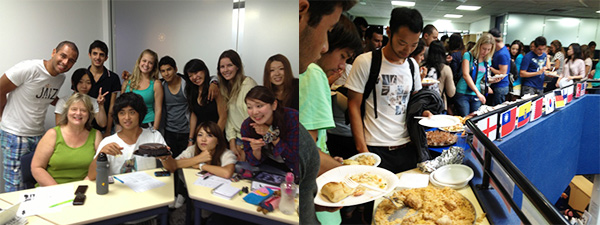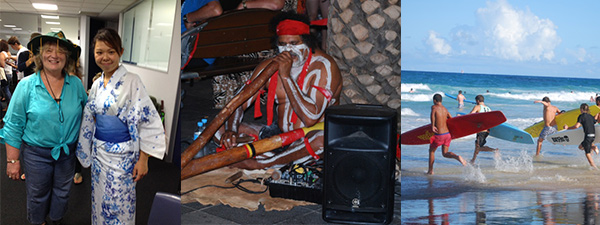 Touch down — the plane finally touched down and you feel mother earth under your feet after a long flight from someplace other than Australia. “How long was your flight?” This question often begins a class discussion with each student trying to say how long his or her flight was.
Touch down — the plane finally touched down and you feel mother earth under your feet after a long flight from someplace other than Australia. “How long was your flight?” This question often begins a class discussion with each student trying to say how long his or her flight was.
“I’ve done it. I made it alone. I am free from family, free from all the rules and protocols of my country. YAY! Australia is freedom, the beginning of a new adventure and chapter of my life.”
I am a teacher at Langports and my name is Esta. I am a New Zealander, born in Cape Town, South Africa, now living in Australia. Every week new students arrive from all over the world to study English at Langports. It is fascinating to discover that most students coming to the Gold Coast also love the sea as I do.
I am passionate about the interaction of people from different cultures and I am lucky that this passion of mine enables me to be with the youth of the world. I believe by walking, talking and interacting with people from different cultures we can make a difference in explaining our culture to each other in order to create understanding and mutual respect. I hope that through this understanding, we will be able to create a universe where people are will live in harmony with each other.

In New Zealand apart from being a teacher, I was a volunteer for the AFS Intercultural Programmes. Luckily, they also have a branch here in Queensland. The aim of AFS is to promote peace through intercultural exchange programmes. The knowledge gained at this organisation helped me a lot in my teaching because I can quickly recognise the different phases of culture shock. When one moves from one country to another, or between social environments, or simply travelling to another type of life, one usually experiences culture shock. This term means that one could have a feeling of not knowing what to do or how to do things in a new environment, and not knowing what is proper or improper.
Arriving in a new country is like starting a new adventure. Most people experience this period in a romantic light. Some love the new food, the pace of life and the locals’ habits. Most people find the new culture fascinating and the students are glad when they find locals who speak their language and who are polite to foreigners. Students usually make lots of discoveries and everything is new and exciting. Social scientists calls this phase the ‘honeymoon stage’ of the intercultural experience.
As we are all different, there is no true way to entirely prevent culture shock as individuals in any society are personally affected by cultural contrasts differently. When we are confronted with a new culture some people starts to feel an information overload, others feel the language barrier is too great, other feel homesickness for their culture or their family, or they lack the cultural skills to respond appropriately. Sometimes it is a generation or technology gap that triggers culture shock. The symptoms of cultural shock can appear at different times. Although, one can experience real pain from culture shock; it is also an opportunity to evaluate your goals. It is a great chance for learning and acquiring new perspectives. It can make one develop a better understanding of oneself and kindle personal creativity.
How do you when you suffer from culture shock? Culture shock can start within a week to six weeks from arrival. Common symptoms are: sadness, loneliness, melancholy; preoccupation with health, aches, pains, and allergies; insomnia, the desire to sleep too much or too little; changes in temperament, depression, feeling vulnerable, feeling powerless; anger, irritability, resentment, unwillingness to interact with others; identifying with the old culture or idealizing the old country; loss of identity; trying too hard to absorb everything in the new culture or country; unable to solve simple problems; lack of confidence; feelings of inadequacy or insecurity; developing stereotypes about the new culture; developing obsessions such as over-cleanliness; longing for family; feelings of being lost, overlooked, exploited or abused. To make it simple, when a student says: “The rice is not as good as back home”; “The beef in my country tastes better”; “The bread here is no good”; “The fruit is tasteless” or “The Aussies are lazy”, one can assume that he or she is experiencing some sort of culture shock. Some students are adventurous and are trying all things, but others stick to what is familiar and safe. It depends on the individual and it is normal.
After about three months the differences between the old and the new culture could be so prominent that it could create anxiety. This negotiation phase is characterised by unpleasant feelings of frustration and sometimes anger as you experience unfavourable events. The language barrier could become frustrating and one can feel that you don’t learn the language fast enough. People could misread your body language or you could be reading the locals incorrectly. Your sleeping patterns are disrupted because the locals get up and sleep at different times to that of home and one might experience sleeplessness and daylight drowsiness. On top of that, your body needs to get used to different gut flora and water.
Students who are studying for 6 to 12 months will enter the next phase, called the adjustment phase. This is one when one gets used to the new culture and develops routines. By now the students know what to expect in most situations and the host country no longer feels all that new. They become worried with basic living again, and things become more “normal”. They start to develop problem-solving skills for dealing with Australian culture and begin to accept the culture’s ways with a positive attitude. The culture begins to make sense, and negative reactions and responses to the culture are reduced.
Many Langports students stay for a year and by that time they have entered the mastery stage where they are able to participate fully and comfortably in Australian culture. They still have their accents and language but they feel at home. Just when the going gets good, they have to go home.
Going home it not difficult because it is home, isn’t it? Yes, it is, but you have changed. Returning to the home culture after getting used to Australia can produce the same effects as I have explained, it is called “Reverse Culture Shock” or “Re-entry Shock”. This is quite surprising because it can be more difficult to deal with than the original culture shock.
I have a few tips on how to fight culture shock. Develop a new hobby or learn something new like surfing, scuba diving or swimming. Be patient and don’t be too hard on yourself. Learn to include a regular form of physical activity in your routine because it will help with feelings of loneliness and sadness. Dancing is a very good form of exercise if you do not like gyms. Meditation is also good to relax or go for a walk along the beach.

Go out with people of the same cultural group because this will give you a feeling of belonging and it will reduce your feelings of loneliness and alienation. If you are frustrated with your speed of learning English, try to stay in a share house environment with students from countries other than your own. That way, you all are forced to speak English and you will be able to communicate easier with the locals. Try to join a local club or do volunteer work.

You may miss your family and friends wishing they were here with you, but that is normal. Focus on getting through this stage of transition and establish simple goals that you can achieve. Relationships at school and if you have a job, are important because they as well as your family, can support you in difficult times. Uphold confidence in yourself and follow your plans and ambitions for the future. It you feel stressed, look for help. There is always someone to help you at Langports.
They key may be in the phrase that I have learnt at AFS: It is not right or wrong, it is just different.
Written by Esta Mostert – Teacher